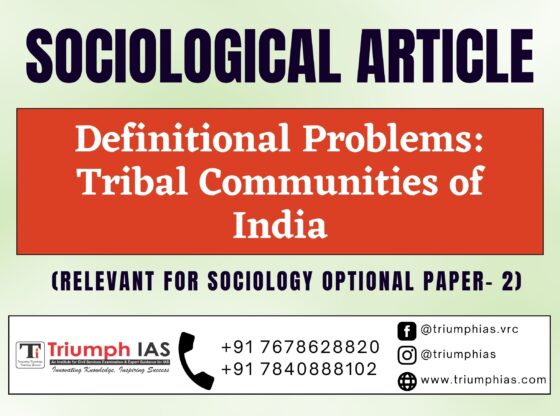Definitional Problems: Tribal Communities of India
Relevant for sociology optional Paper- 2 (Unit- 12 : Social Structure)

The term ‘tribe’ has been widely used to describe indigenous communities across the world, including in India. However, the use of this term has been problematic, leading to a number of definitional issues when it comes to identifying and describing tribal communities in India. This essay will explore these definitional problems and their implications for these communities.
The term ‘tribe’ was first used in colonial India to describe the various communities that lived outside the Hindu caste system. These communities were often seen as ‘primitive’ and ‘uncivilized’ by the colonial authorities, who sought to categorize and control them. The term ‘tribe’ was thus used to create a binary between the ‘civilized’ and the ‘uncivilized’, with the former being seen as superior and the latter as inferior.
This colonial legacy has continued to influence the way in which tribal communities are defined and understood in India today. The term ‘tribe’ is still widely used to describe these communities, despite the fact that it is a deeply problematic term. For one, it suggests a homogeneity among these communities that simply does not exist. India is home to over 700 different tribal groups, each with their own distinct cultures, languages, and traditions. The use of the term ‘tribe’ obscures these differences and reduces these communities to a single, monolithic group.
Moreover, the term ‘tribe’ is often associated with notions of primitiveness, backwardness, and lack of development. This is a legacy of the colonial period, when these communities were seen as inferior and in need of ‘civilizing’. Today, however, many tribal communities have their own rich cultural traditions, knowledge systems, and ways of life that are worthy of respect and preservation. The use of the term ‘tribe’ perpetuates these negative stereotypes and undermines efforts to recognize and celebrate the diversity of these communities.
Another issue with the term ‘tribe’ is that it is often used in a legal and administrative context. In India, tribal communities are officially recognized as ‘Scheduled Tribes’ under the Constitution, which grants them certain protections and benefits. However, the process of identifying and defining these communities is fraught with difficulties. The criteria used to identify Scheduled Tribes are often arbitrary and do not necessarily reflect the cultural or social realities of these communities. This can lead to communities being left out of the official list of Scheduled Tribes, or being included despite not identifying as such.
Moreover, the process of defining tribal communities in legal and administrative terms can have negative consequences for these communities. For example, the categorization of communities as ‘Scheduled Tribes’ can lead to their marginalization and exclusion from mainstream society. This is because these communities are often seen as being outside the dominant social order, and are therefore subject to discrimination and prejudice.
Furthermore, the use of legal and administrative categories can also lead to the commodification of tribal cultures and traditions. For example, the promotion of ‘tribal tourism’ can reduce these communities to mere spectacles for the entertainment of tourists, rather than recognizing their cultural and social significance. Similarly, the use of traditional knowledge and practices by outsiders without the permission or consent of these communities can lead to the appropriation and exploitation of their cultural heritage.
In conclusion, the use of the term ‘tribe’ to describe indigenous communities in India is deeply problematic. It obscures the diversity and richness of these communities, perpetuates negative stereotypes, and can lead to their marginalization and exploitation. Instead, there is a need to recognize and celebrate the cultural and social diversity of these communities, and to engage with them on their own terms. This requires moving beyond legal and administrative categories, and recognizing the complex and dynamic nature of these communities and their traditions.
For more such free UPSC notes, Articles, News & Views Join our Telegram Channel. https://t.me/triumphias
Click the link below to see the details about the UPSC – Civils courses offered by Triumph IAS. https://triumphias.com/pages-all-courses.php


